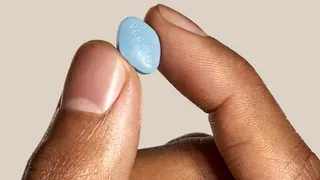October 26, 2011
Gay Youth: Coming of Age in the Marriage-Equality Era
Megan Barnes READ TIME: 5 MIN.
Certainly, as a glance at the headlines on this website any given day proves, the fight for equality is far from done. But today's LGBT youth are growing up with a far different picture: They have open classroom discussions about gay rights; look up to out-gay entertainers, clergy, politicians and, yes, more and more athletes. And now they're not only seeing same-sex couples get married and raise kids but also are coming into a world where it is rapidly being considered the norm.
Newly released census data shows there are more than 900,000 same-sex households in the United States and that 22 percent are raising children, according to the Williams Institute. They are moving out of the gay ghettos and into every county in the United States. It's a world of difference from the ostracism of years past.
"Marriage is on the minds of LGBT youth more so than ever before," said Dr. Anthony D'Augelli, a professor of human development at Pennsylvania State University. But he also believes that it was a goal for many of us before Massachusetts made it a reality and started the ball rolling toward same-sex legal marriages in the United States.
We've Wanted Marriage For a Long Time
In the early 2000s, before same-sex marriage licenses were handed out in San Francisco (briefly) and Massachusetts, he and a team of researchers interviewed 133 young gay men and lesbians about their feelings of getting married and starting families.
The findings: More than 90 percent of females and 80 percent of males saw themselves in monogamous long-term relationships after age 30. Two-thirds of the females and more than half of the males could envision themselves raising children someday.
At the time, the results surprised D'Augelli. I just didn't think that was on their minds as much as other kinds of issues," he said, "But no one ever asked them."
Today, with highly publicized same-sex marriage battles happening across the nation, it doesn't surprise him as much that young people are so aware of marriage -- or LGBT issues in general, for that matter. "We know a lot more than we used to. There are more out, they're out at earlier ages, more of them are accepted by their parents than ever before, by their peers and siblings than ever before," he said. "All of these historical changes have brought along a whole different kind of approach to gay adolescence."
Seeing same-sex marriage and families become more of a reality opens doors and affects youth's projections of themselves in the future. "Now not only do more families accept them, not all the time, but more so than ever," D'Augelli said. "But the families actually look forward to having a wedding and look forward to having grandchildren."
Salvatore Garanzini, a same-sex couples' counselor in San Francisco, has had a few young married couples come through his doors at the Gay Couples Institute. He sees more at his workshops; the more expensive one-on-one therapy isn't as accessible for most young people.
The brief window when same-sex marriage was legal in California in 2008 provided him with a shock. His phone was ringing off the hook from young couples that had had shotgun, Vegas-style quickie weddings. "They met their boyfriend or girlfriend over the weekend, really hit it off and got married at the courthouse," he said. "Two or three months later, they were calling us for help." Wed in haste, repent at leisure, as they used to say.
Garanzini's youngest couple seeking counseling consisted of two men, 18 and 19 years old. Two relatively recent developments have changed LGBT youth's aspirations for getting married: the Internet, where gay or questioning youth are connecting; and the same-sex marriage battle, which is legitimizing that drive to connect.
So has coming of age during the fight for marriage equality heightened today's gay twentysomethings interest in marriage? Garanzini and D'Augelli aren't so sure. Young people, gay or straight, aren't exactly rushing to the altar.
LGBT youth who may have decided early in adolescence that they didn't fit in with the norm see marriage as even less relevant. "In their late 20s, their hetero friends all start getting married and having kids and putting their pictures up on Facebook," he said. "But they don't necessarily feel subscribed to having to be married by 29 and have a kid by 33."
One thing is for sure: Marriage certainly does not always equal monogamy in the gay community. A 2010 San Francisco State University study of more than 500 gay male married couples found that half are consensually non-monogamous.
"Civil union, marriage, domestic partner, all of those things go into the bucket of shared meaning," Garanzini said. "The more shared meaning a couple has, the better they weather storms."
Marriage Equality as a Rights Struggle
Garanzini disagrees with those who argue that LGBT youth's interest in marriage and long-term monogamy is somehow conforming to straight culture. Nor is it a top-down issue -- something that gay organizations and leaders have prioritized, and the rank-and-file simply adopted it.
Rev. Dr. Neil Thomas of the Metropolitan Community Church in Los Angeles, who has performed about 130 gay weddings (no couples in their 20s), says the change happening across the country isn't so much about LGBT people assimilating with mainstream society, but rather, the dominant culture opening outward. Or at least it should be that way.
"The more we extend ourselves to this kind of radically inclusive community, the more we find that we have a fully function-able, contributing society," he said. "It obviously opens up the potential of what it means to be LGBT youth in this society. Whereas many LGBT youth in my generation had to come to a reconciliation that marriage was not an option, that's no longer the case."
J.B. Beeson, 25, and Causten Wollerman, 27, are educated, urban self-identified "queers" who think long and hard about issues like marriage in terms of the larger picture, such as the institution's history and its effect on society. So it's not surprising that the two New Yorkers were initially not interested in getting married, even when it became available in their home state. Beeson still calls marriage "a patriarchal idea that doesn't benefit anyone, and it's a heteronormative ideal. But," she added, "as we've been together, we've both softened about it."
She met Wollerman (who identifies as genderqueer and is herself transgendered) on election night in 2008. They began dating a year later and are now engaged, but haven't set a wedding date yet. When Wollerman, who is a political organizer, was working on marriage campaigns, they started to reconsider. "I realized that once I'd been with Causten, I really wanted to get married," Beeson said. "My politics around it changed. I was led more by desire than criticism."
They're not the first of their lesbian or gay friends to get married, and their friends who ideologically criticize marriage are supportive.
"It's not exactly the goal for some of our more radical and political friends," Beeson said. "But that's OK. We are doing what we want and it's incredibly exciting for us. Although it isn't federal, which are really the rights that we would like to have as a married couple, it still is special to be living in New York and know that our relationship can be deemed marriage by our state."
Megan Barnes is a freelance journalist in Los Angeles. She regularly contributes to EDGE, San Pedro Today and was a founding editor of alternative UCSB newspaper The Bottom Line. More of her work can be found at www.megbarnes.com



